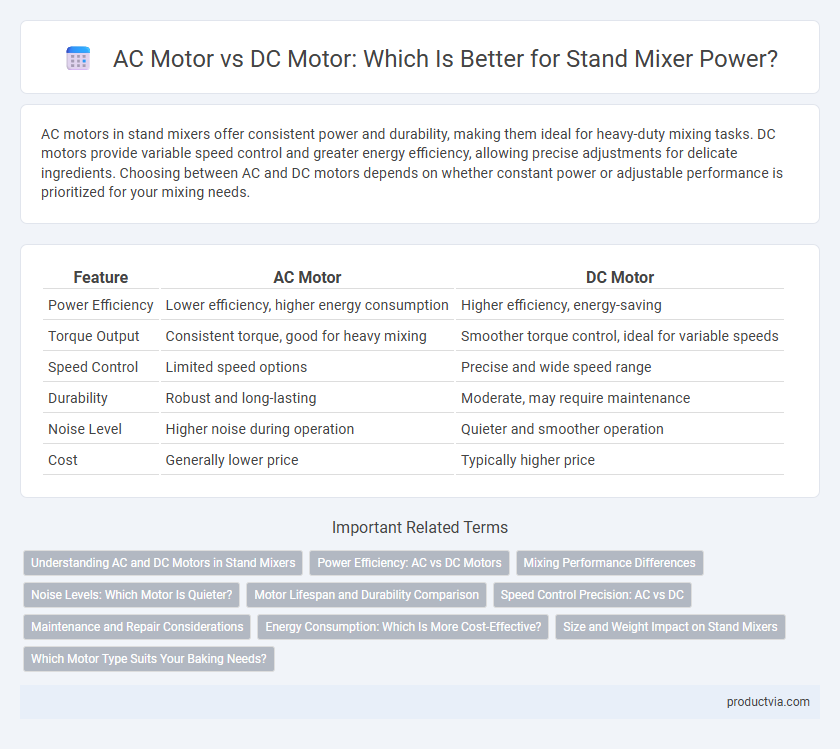AC motors in stand mixers offer consistent power and durability, making them ideal for heavy-duty mixing tasks. DC motors provide variable speed control and greater energy efficiency, allowing precise adjustments for delicate ingredients. Choosing between AC and DC motors depends on whether constant power or adjustable performance is prioritized for your mixing needs.
Table of Comparison
| Feature | AC Motor | DC Motor |
|---|---|---|
| Power Efficiency | Lower efficiency, higher energy consumption | Higher efficiency, energy-saving |
| Torque Output | Consistent torque, good for heavy mixing | Smoother torque control, ideal for variable speeds |
| Speed Control | Limited speed options | Precise and wide speed range |
| Durability | Robust and long-lasting | Moderate, may require maintenance |
| Noise Level | Higher noise during operation | Quieter and smoother operation |
| Cost | Generally lower price | Typically higher price |
Understanding AC and DC Motors in Stand Mixers
AC motors in stand mixers provide consistent power with a reliable speed range, ideal for heavy-duty mixing tasks, while DC motors offer precise speed control and energy efficiency, enhancing versatility for delicate recipes. The choice between AC and DC motors impacts torque output, noise levels, and overall mixer performance, with AC motors typically delivering higher torque and DC motors running quieter. Understanding these motor types helps users select stand mixers that balance power, control, and efficiency according to their cooking needs.
Power Efficiency: AC vs DC Motors
DC motors in stand mixers generally offer higher power efficiency than AC motors due to their precise speed control and reduced energy loss during operation. AC motors tend to operate at a fixed speed and can consume more power as they lack variable control, leading to increased energy consumption in stand mixers. The improved efficiency of DC motors translates into longer motor life and consistent mixing performance with less electricity usage.
Mixing Performance Differences
AC motors in stand mixers typically offer consistent speed and strong torque, making them ideal for heavy-duty mixing tasks like kneading dough. DC motors provide more precise speed control, enabling smoother transitions and finer adjustments for delicate mixing processes such as whipping egg whites. The choice between AC and DC motors directly influences the mixing performance, with AC excelling in power and durability while DC excels in variable speed efficiency and control.
Noise Levels: Which Motor Is Quieter?
AC motors in stand mixers typically produce more noise due to their synchronous operation and higher vibration levels, making them less ideal for quiet kitchen environments. DC motors offer smoother, quieter performance thanks to their brushless designs and precise speed control, significantly reducing operational noise. Consumers seeking a quieter stand mixer often prefer models equipped with DC motors for their superior noise reduction capabilities.
Motor Lifespan and Durability Comparison
AC motors in stand mixers generally offer longer lifespan and greater durability due to their simpler design and fewer moving parts, reducing wear over time. DC motors, while providing variable speed control and higher efficiency, may experience shorter operational life because of brushes and commutators that require periodic maintenance. Choosing an AC motor often means enhanced reliability for heavy-duty mixing tasks, whereas DC motors suit precision and energy-saving needs but may need more frequent replacement or servicing.
Speed Control Precision: AC vs DC
DC motors in stand mixers offer superior speed control precision compared to AC motors due to their ability to adjust voltage and current smoothly, enabling finer speed variations. AC motors typically operate at fixed speeds based on frequency, resulting in less accurate speed control. This enhanced precision in DC motor-driven mixers allows for consistent mixing results, especially when handling delicate ingredients or complex recipes.
Maintenance and Repair Considerations
AC motors in stand mixers offer simpler maintenance with fewer electronic components, reducing the risk of electrical failures and making repairs more straightforward. DC motors, while providing more precise speed control, often require more complex servicing due to brushes and additional circuitry that can wear out over time. Choosing an AC motor stand mixer typically results in lower maintenance costs and easier repairs, enhancing long-term reliability for regular kitchen use.
Energy Consumption: Which Is More Cost-Effective?
DC motors in stand mixers generally consume less energy than AC motors, resulting in lower electricity costs over time. AC motors provide steady power but often have higher energy consumption due to continuous current flow. Choosing a DC motor can enhance energy efficiency, making it a more cost-effective option for frequent use.
Size and Weight Impact on Stand Mixers
AC motors in stand mixers are generally larger and heavier, which can increase the overall bulk and reduce portability of the appliance. DC motors offer a more compact and lightweight design, contributing to sleeker stand mixer models that are easier to handle and store. The reduced size and weight of DC motors also enhance energy efficiency and allow for quieter operation in modern stand mixers.
Which Motor Type Suits Your Baking Needs?
AC motors in stand mixers provide consistent torque and reliable long-term performance, ideal for heavy dough and continuous mixing tasks. DC motors offer variable speed control and energy efficiency, making them suitable for precision mixing and lighter baking jobs. Choosing between AC and DC motors depends on whether durability and power or versatility and control better match your baking requirements.
AC motor vs DC motor for stand mixer power Infographic

 productvia.com
productvia.com